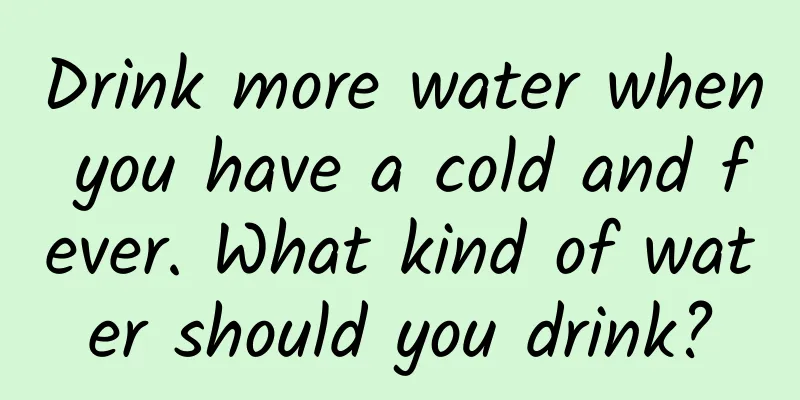Drink more water when you have a cold and fever. What kind of water should you drink?

|
Review expert: Wang Xuejiang, professor at Capital Medical University Recently, influenza has been prevalent, and many of our friends have been affected, with most people having symptoms of fever. At this time, most people choose to cool down by drinking a lot of water to increase the frequency of urination and sweating, or drink a lot of water to relieve the body's dehydration caused by increased sweating. So, why do you need to drink more water when you have a cold and fever? What kind of water should you drink? Why should you drink more water when you have a cold or fever? Whenever we have a cold or a fever, the most common advice we hear is to drink more water. So, can drinking water really relieve fever symptoms? In fact, drinking more water when you have a cold or fever is really good for your body: It can speed up the patient's metabolism, increase urine volume, and promote the excretion of toxins through frequent urination. For people with fever symptoms, drinking more water can dissipate heat through the evaporation of sweat or the excretion of urine, thereby lowering body temperature and helping to relieve fever symptoms. Replenishing the water lost due to vomiting and diarrhea is beneficial to the body's recovery. Keeping the oral and nasal mucosa moist can prevent the invasion of cold viruses to a certain extent and relieve the discomfort symptoms caused by colds. When we have a cold or fever, we should drink enough water intermittently, 200-300 ml each time, slowly drinking in small sips to maintain the balance of electrolytes in the body. However, we should drink enough water, generally not more than 3000 ml. 01 What is electrolyte water? Electrolyte water refers to a beverage made by dissolving a group of compounds in water. It contains electrolytes needed by the human body, such as sodium ions, potassium ions, magnesium ions, as well as energy substances such as citrate, sucrose, glucose, vitamin C and vitamin B6. Electrolyte water can be quickly absorbed by the human body. Its main function is to replenish the water and trace elements needed by the human body and maintain the body's electrolyte balance and acid-base balance. In addition to replenishing the body's trace elements, electrolyte water can also promote metabolism and improve the body's immunity. Under normal circumstances, the human body can maintain a dynamic balance of the body's internal environment of water, ion concentration, pH and osmotic pressure through self-regulation. Once the water, electrolyte and acid-base balance is disturbed, cell function will be affected and diseases will be induced, such as: Sodium metabolism disorders can cause symptoms such as fatigue, irritability, and muscle aches; potassium metabolism disorders can cause symptoms such as thirst and nausea; calcium metabolism disorders can cause symptoms such as slow reaction and convulsions of the hands and feet; magnesium metabolism disorders can cause symptoms such as dizziness and muscle cramps. If the electrolyte imbalance is severe, it may be life-threatening. 02 Can electrolyte water help reduce fever? Since electrolyte water is so powerful, can drinking more of it also help reduce fever? The answer is no. Fever patients sweat a lot, which can cause dizziness, fatigue and other symptoms of dehydration. In this case, proper electrolyte supplementation is beneficial to the body's recovery. In addition, most fever patients have poor appetite. Many electrolyte waters on the market taste good. Drinking them properly can solve the problem of electrolyte imbalance and maintain normal body functions. On the other hand, because they taste good and make people happy, they are also good for the body's recovery. But if you want to reduce fever by drinking electrolyte water, it won't work. Electrolyte water can achieve the so-called "cooling" effect. Its mechanism of action is not that it is electrolyte water, but because the patient will sweat a lot when he has a fever, which takes away a lot of water and electrolytes from the body. When the water is replenished, the metabolism speeds up, which is beneficial to the body's heat dissipation. From this point of view, the effect of drinking electrolyte water is similar to that of drinking boiled water. 03 What symptoms can be treated by drinking electrolyte water? Wang Boshi, deputy chief physician of the Clinical Nutrition Department of Peking University People's Hospital, said that people who can eat normally after a fever generally do not need to supplement electrolytes. If the high fever lasts for a long time and nausea, vomiting, diarrhea, and poor appetite occur, it is recommended to supplement electrolytes appropriately on the basis of drinking boiled water. When the fever persists or is high, low sodium, low potassium, and low calcium may occur. This is because the patient has a continuous high fever, and the body will sweat a lot when the fever subsides, resulting in electrolyte loss. Proper supplementation of electrolytes is conducive to physical recovery. Pregnant women may experience nausea, vomiting and other early pregnancy reactions. If severe vomiting occurs, or even the inability to eat normally, it will cause insufficient intake of inorganic salts such as potassium and sodium, leading to electrolyte imbalance. If severe morning sickness or inability to eat occurs during pregnancy, you should seek medical attention in a timely manner and supplement electrolytes under the evaluation and guidance of professionals. Vomiting after drinking will cause the body to lose electrolytes, aggravating the effect of alcohol on liver function. Excessive drinking may also indirectly cause kidney disease and electrolyte and acid-base imbalance. When diarrhea occurs, a lot of water and electrolytes are lost, which may lead to dehydration and electrolyte imbalance, requiring appropriate electrolyte supplementation. |
>>: AI plays games better than humans? But what's the point of letting AI play games...
Recommend
Moji Weather is about to go public. How far can Moji, which makes 99% of its profits from advertising, go?
The business model of tool products has always be...
When “water from the sky” meets “surface water”: Does heavy rain affect the normal drinking of tap water?
Science Times reporter Hu Lijuan Recently, contin...
What does meat that has been frozen for hundreds of thousands of years taste like?
Image source: Yale.edu On January 13, 1951, membe...
Analysis of Xigua Video's Competitive Products
In early 2021, Xigua Video anchored mid-length vi...
NIO has finally gone public, where will its next life-saving straw be?
On the morning of September 12, Eastern Time, NIO...
Snatching food from the tiger's mouth: the story of WeChat phone book and operators
[[122899]] In the past two days, my friend circle...
Acting US Navy Secretary resigns after calling captain "stupid!"
According to local media reports in the United St...
On the Qinghai-Tibet Plateau, China built a national park larger than Yellowstone Park!
China's first national park is located in the...
A 7.4-magnitude earthquake struck the Fukushima coast. Are nuclear power plants safe?
Author: Gao Yali and Feng Lifei On the evening of...
Don't guess what users are thinking. This is the explosive temperament of smart devices.
Just like maintaining the homeostasis of the huma...
No one knows more about corpses than I do! Not for the faint of heart!
Expert of this article: Zhang Yinming, PhD in For...
Even Sony's Takeshi Soeda doesn't dare to easily say that it's going smoothly. How can PS VR open up a new path in China?
The news of PS VR landing in China has become a h...
How to get the correct way to open big V marketing?
In the current era of self-media, information int...
Tesla Model 3 deliveries begin this month
In the early morning of July 3rd local time, Tesl...
Bidding promotion training institution, how long does bidding training take?
This depends on the organization. Different insti...









